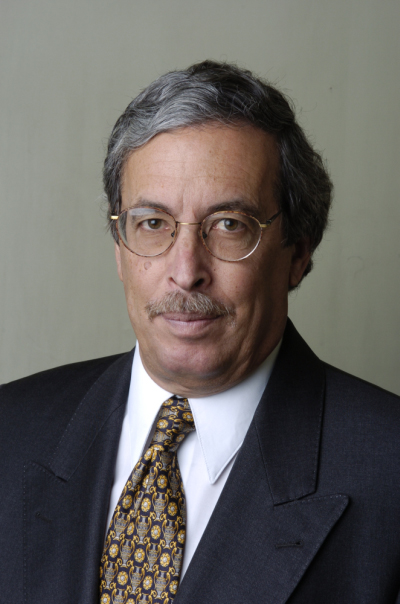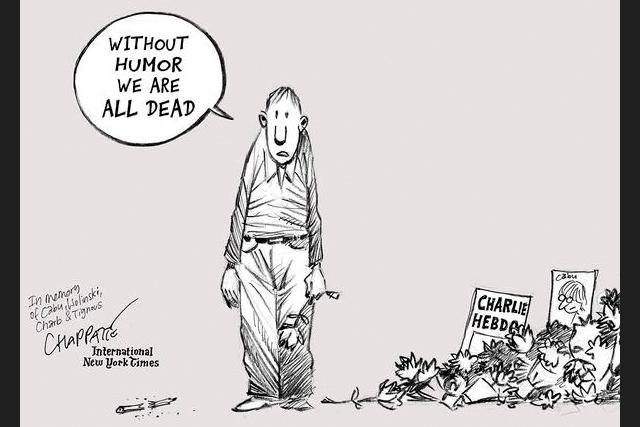Let us laugh together, on principle
The tragic events in Paris tug at our hearts and pose questions to our heads. Our deepest sympathies go to the families and friends of the victims. While we mourn the deaths of the cartoonists and police and are revolted by people being gunned down in premeditated murder, we are led to reflect on what freedom really means and the role of humour.
Many questions are being raised about Islam and its relation to violence. From across the political spectrum, cause-and-effect-corollaries between the teachings of the Koran and violence are being debated. Is there something inherent in Islam that fosters jihadists? Is there something particular about this monotheistic religion that differentiates it from Christianity and Judaism? Neither of these questions are easily answered. But they could also be raised in other forms about Christian Crusaders during the Middle Ages or Jewish settlers recently retaking what they consider to be their Holy Land.

Fundamentalists who are “enlightened” are a special breed. The classic example is Martin Luther. Michael Oakshott described him as follows: “One who understands himself to be a messenger of god, to be ‘illuminated’ from above, or to be the voice of destiny…and…absolves himself from all responsibility for his actions and utterances…has resigned the character of a human being and has contracted out of the conversation of mankind. He is either an angel or a lunatic.”
This “conversation of mankind” is highly complex. Words like “freedom” are not absolutes. It is against the law to yell fire in a crowded movie theatre. You cannot perjure yourself or commit libel. Within the “conversation of mankind” there are legal, political and social limits.
Humour is an essential part of that conversation. As Patrick Chappatte wrote in his Op-ed cartoon in the International New York Times of January 8 that is dedicated “In memory of Cabu, Wolinski, Charb & Tignous”: “Without humour we are all dead.”
With humour we are all alive. We enjoy being with people who tell jokes; we enjoy laughing with others. As the political theorist William E. Connolly highlighted (in one of my favourite sayings); “Let us laugh together, on principle.” (The Geneva heroes immortalized on the Wall of the Reformation look far from jolly!)
Dr Daniel Warner is Assistant Director for International Relations at DCAF, the Geneva Centre for the Democratic Control of Armed Forces. He joined DCAF in 2011 after a long career at the Graduate Institute in Geneva. He also teaches in Kiev at the Diplomatic Academy of Ukraine.
But jokes must be circumscribed. They must be appropriate to the audience or occasion. Otherwise they are not funny. I remember Lenny Bruce screaming “nigger” in a theatre in New York in the late 1960s. He was not trying to be funny; he was trying to make a point to an audience – which included African-Americans – about taboos and inhibitions, about what is appropriate.
The cartoonists at Charlie Hebdo provoke. They walk a thin line between satire, provocation and vulgarity, often combining all three. When they debunk religious figures they are not crying fire in a crowded theatre, but they obviously hold matches to a tinderbox. One person’s joke is another’s insult. The game of Dozens – a game of insults between contestants – has certain rules, even if disparaging another’s mother is part of the action. The game is popular in certain neighbourhoods in the U.S., but definitely doesn’t travel well.
There are no international rules for humour just as we have no international norms for freedom. Slavery has been formally abolished, but not the death penalty. The age for legal child soldiers is hotly debated. Different cultures have different habits and different definitions of civilised. That’s what the disciplines of anthropology and sociology are all about.
“Let us all laugh together, on principle”, means that we should all realise the importance of laughter. My only hope is that we can all find the same jokes or situations funny. Minimally, if we do not find a joke or situation amusing, we should not react violently. If “without humour we are all dead”, then we should all try to find humour and be tolerant of those whose sense of humour differs from ours. That is what it means to be in “the conversation of mankind”. The murders are not part of that conversation, and violent fundamentalists are certainly not angels.
swissinfo.ch publishes op-ed articles by contributors writing on a wide range of topics – Swiss issues or those that impact Switzerland. Over time, the selection of articles will present a diversity of opinions designed to enrich the debate on the issues discussed.

In compliance with the JTI standards
More: SWI swissinfo.ch certified by the Journalism Trust Initiative












You can find an overview of ongoing debates with our journalists here . Please join us!
If you want to start a conversation about a topic raised in this article or want to report factual errors, email us at english@swissinfo.ch.